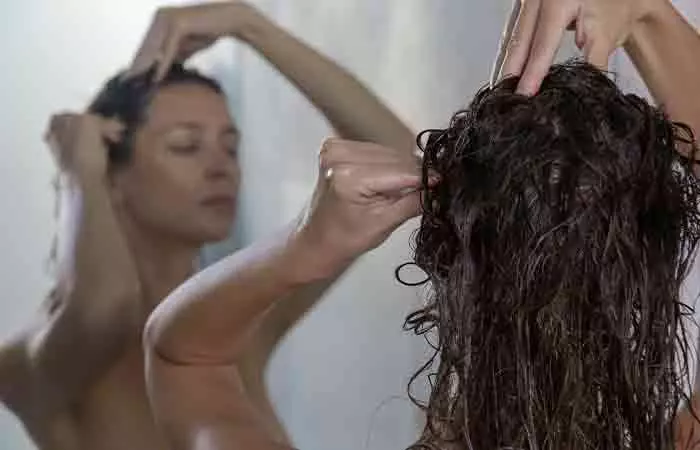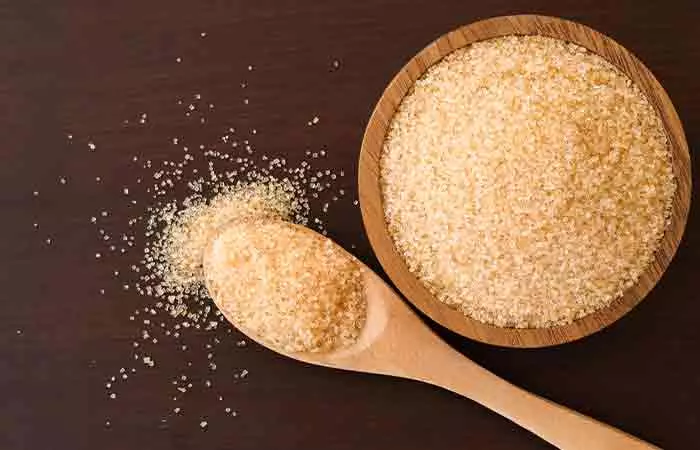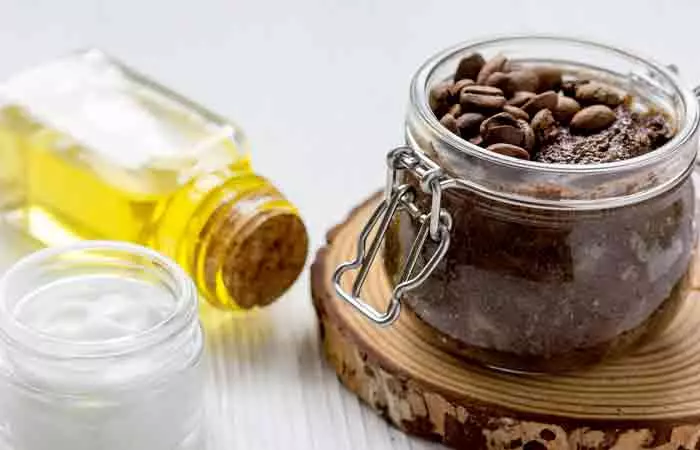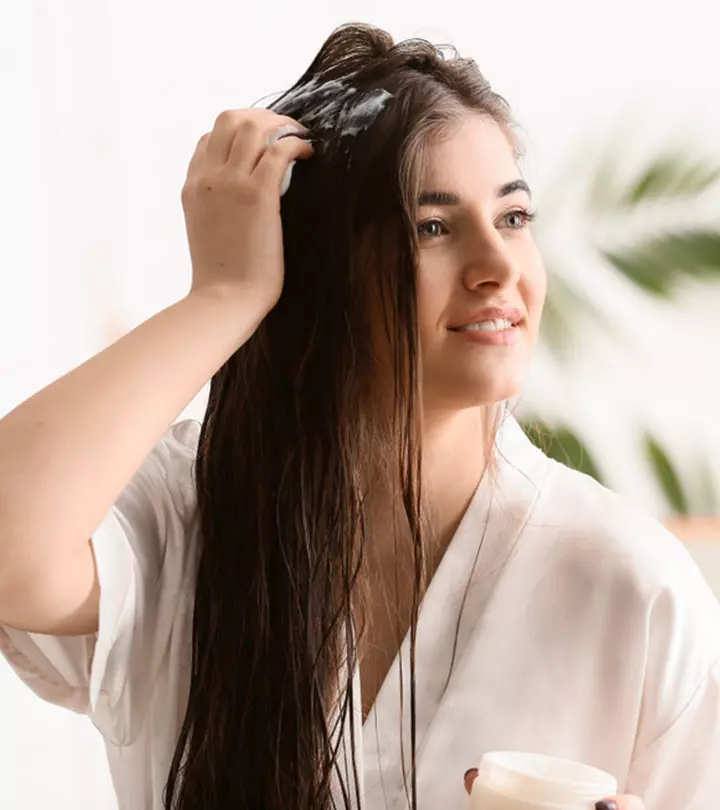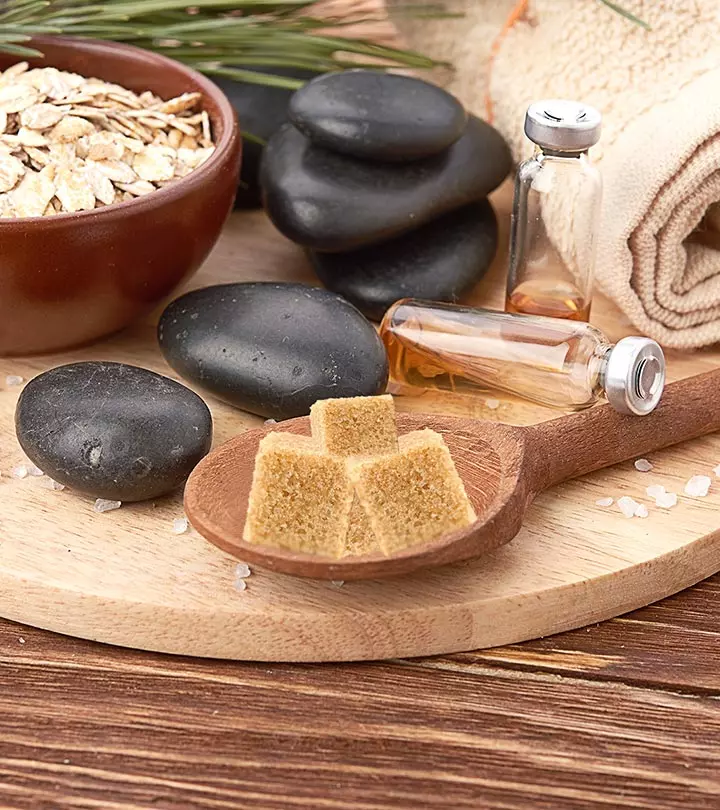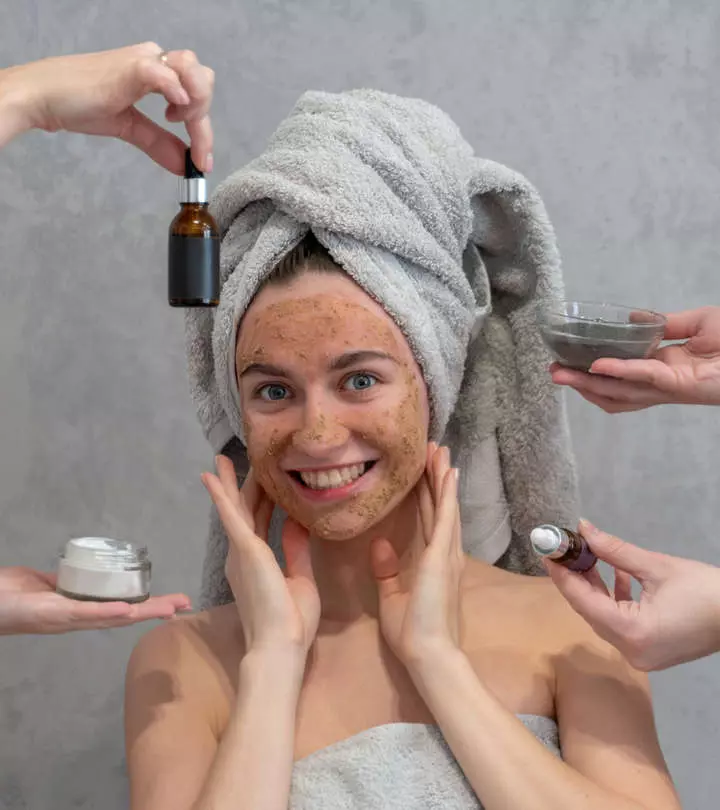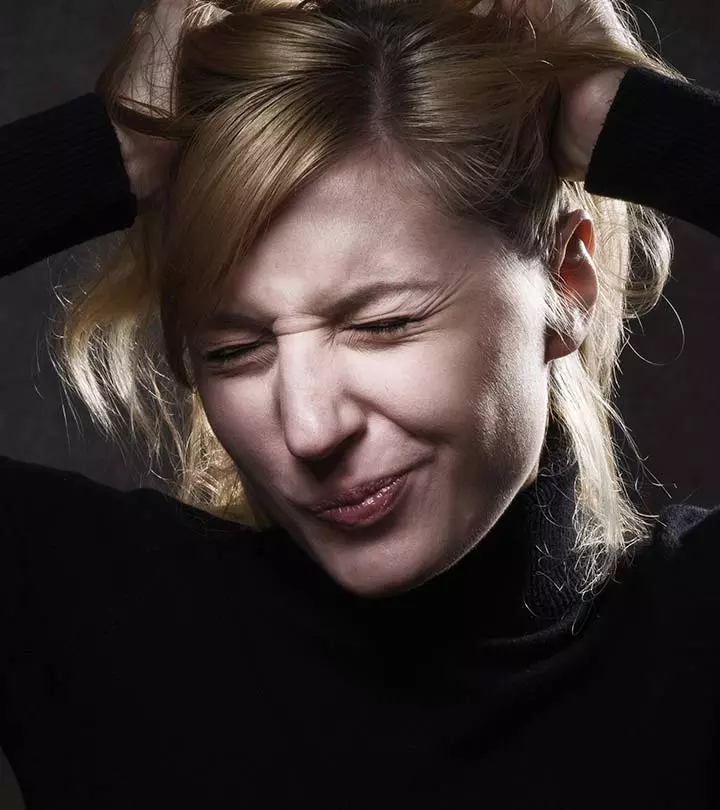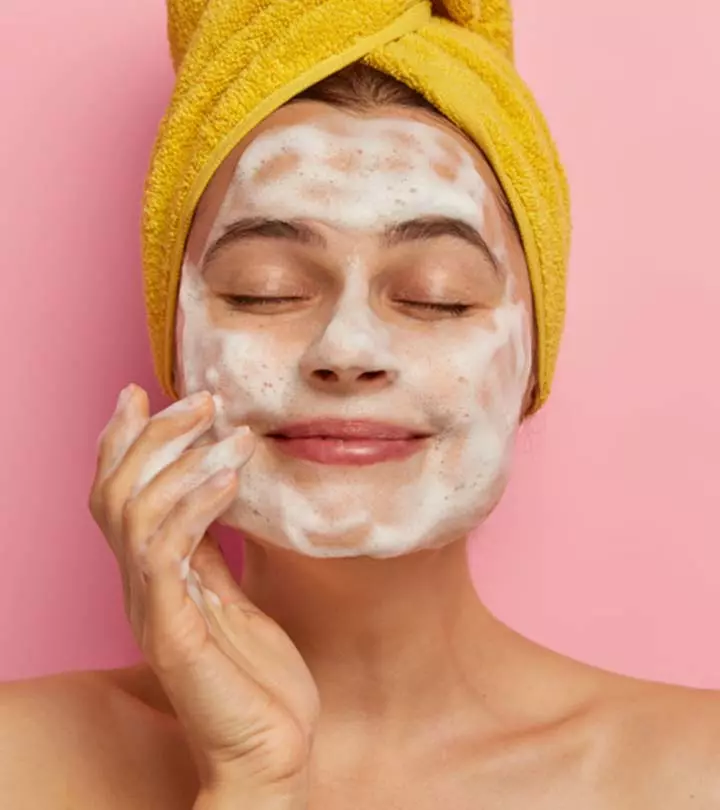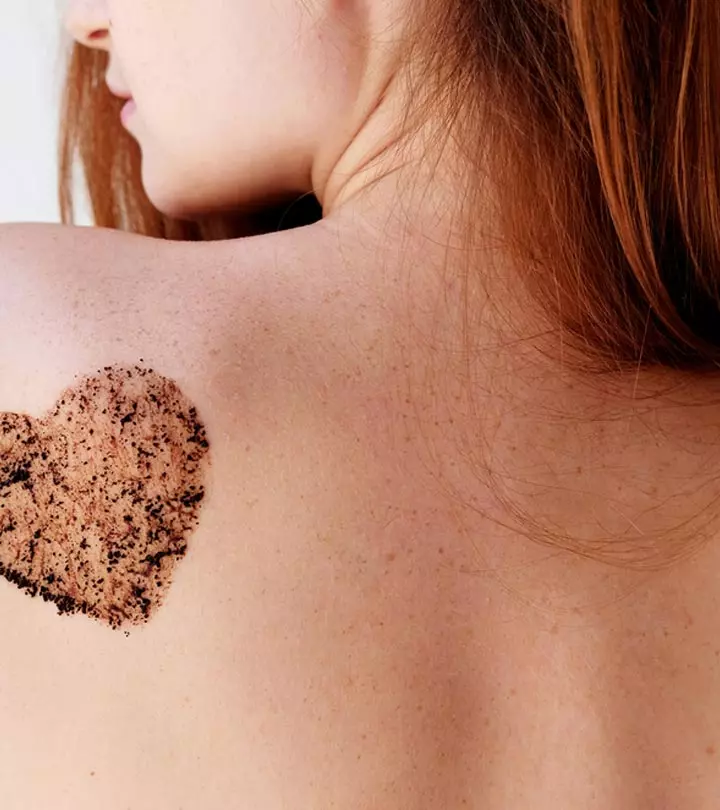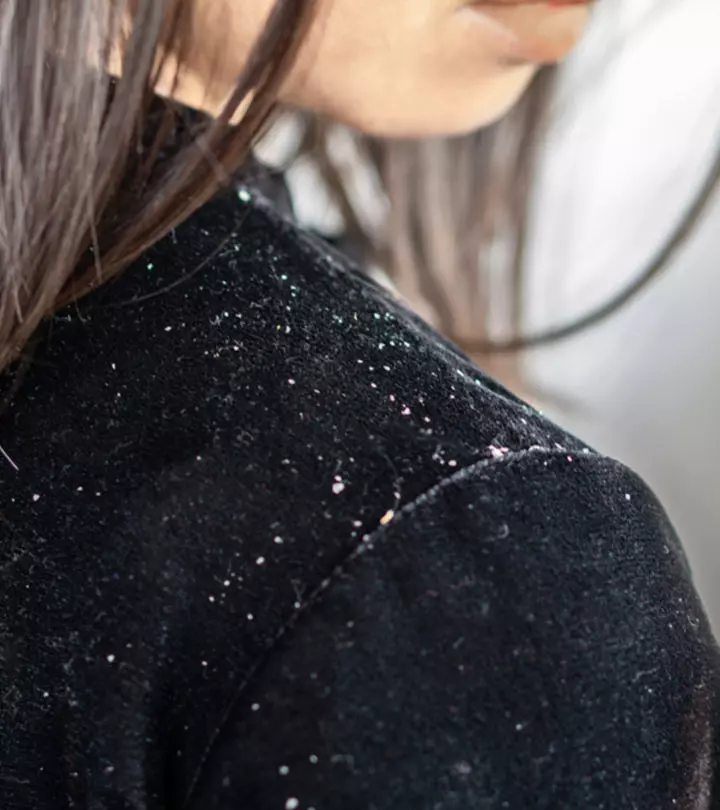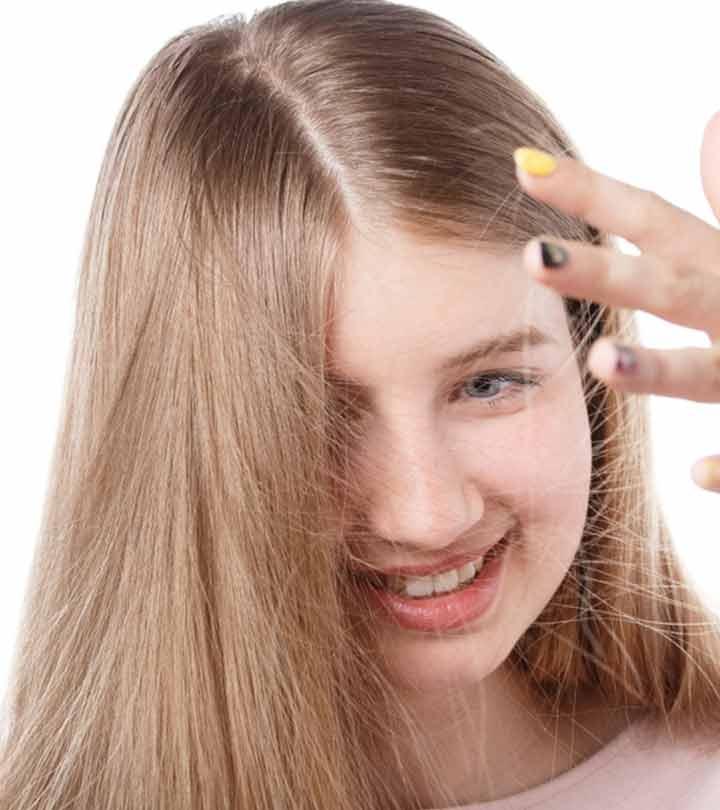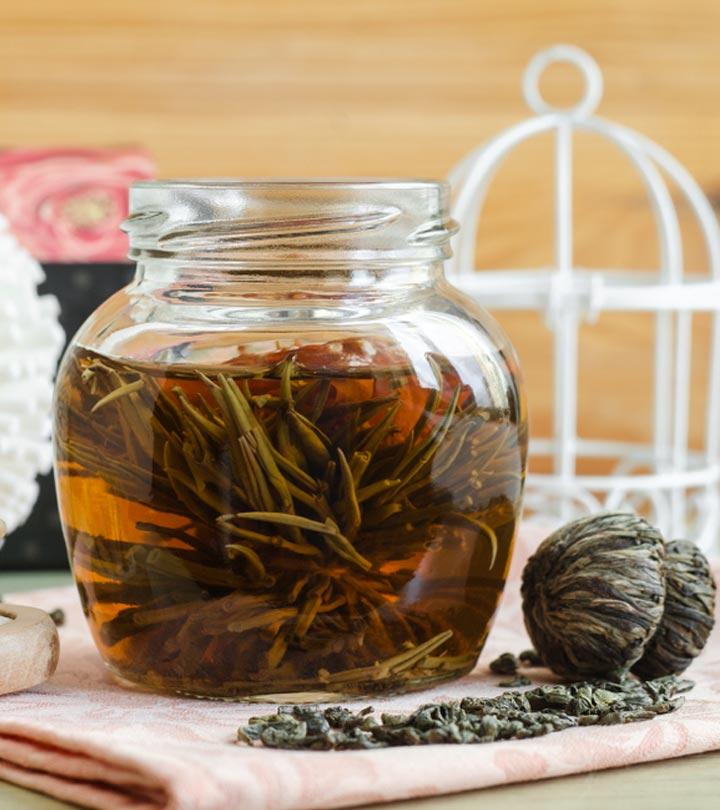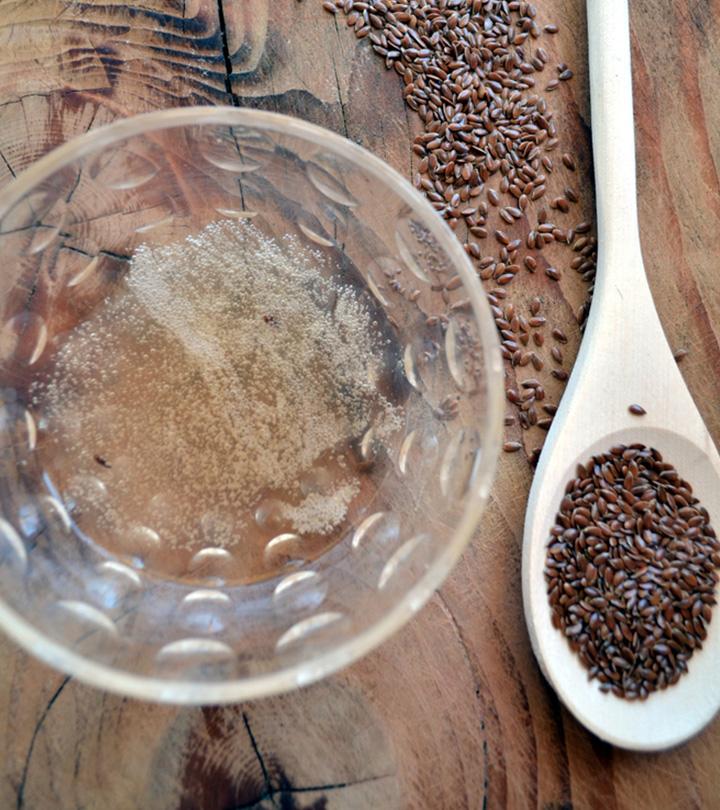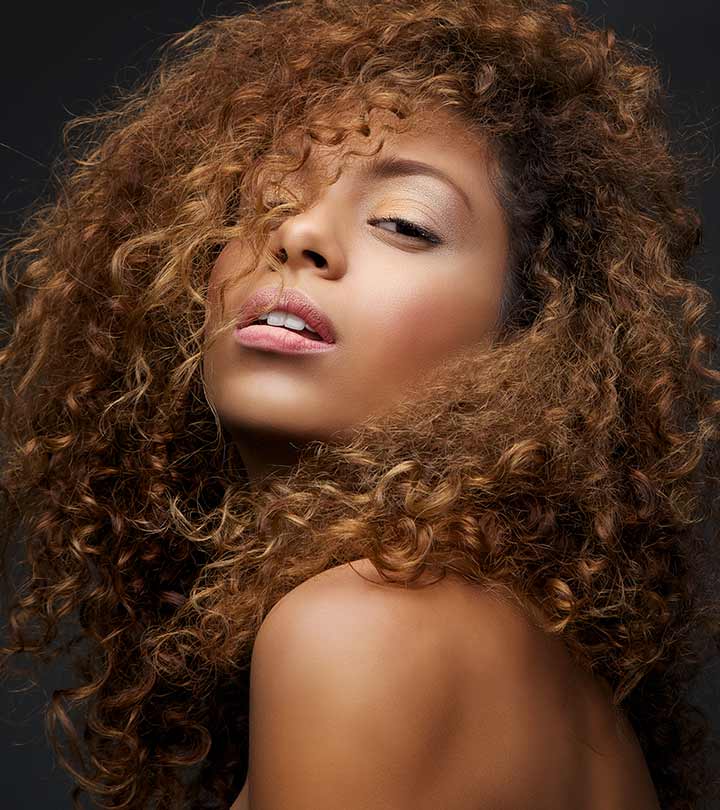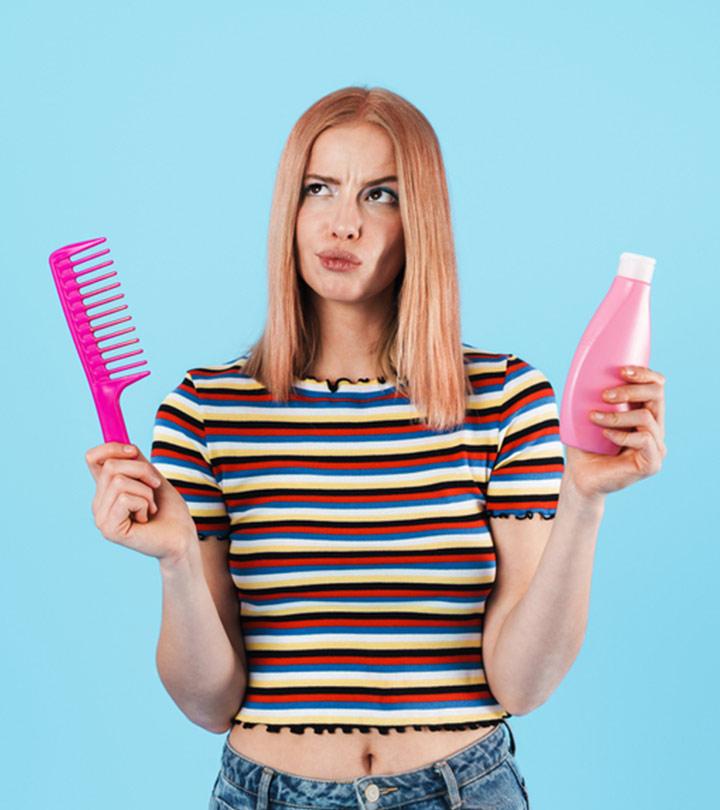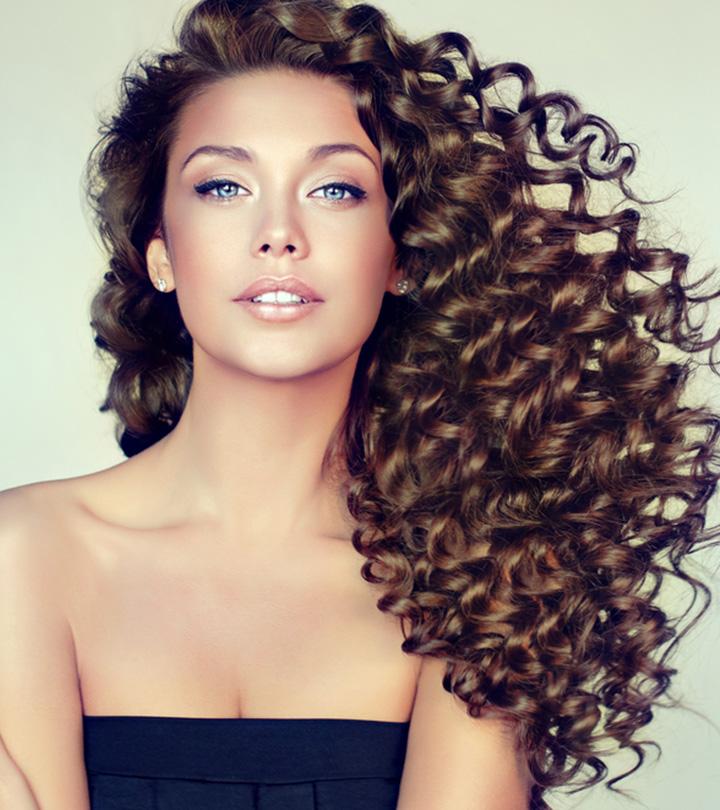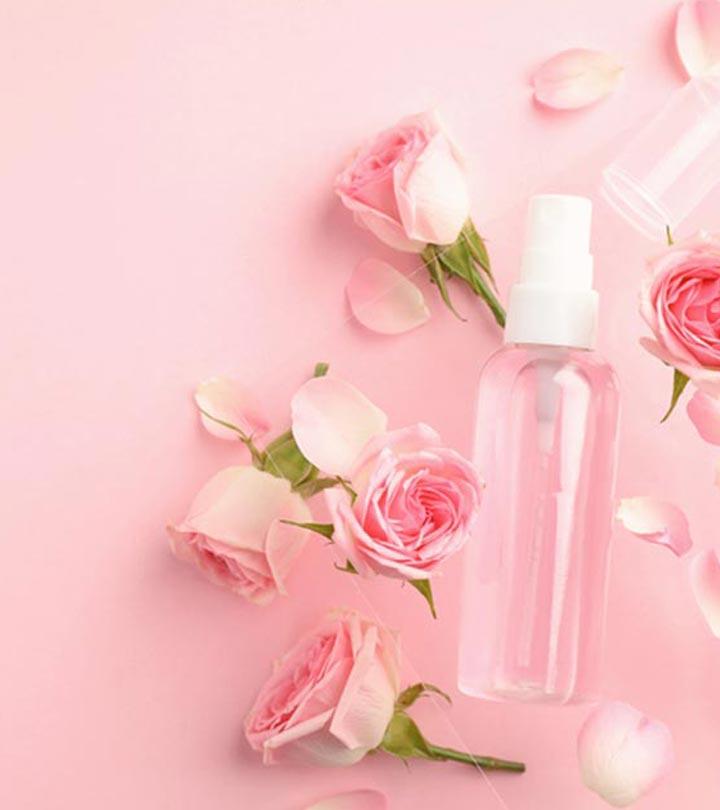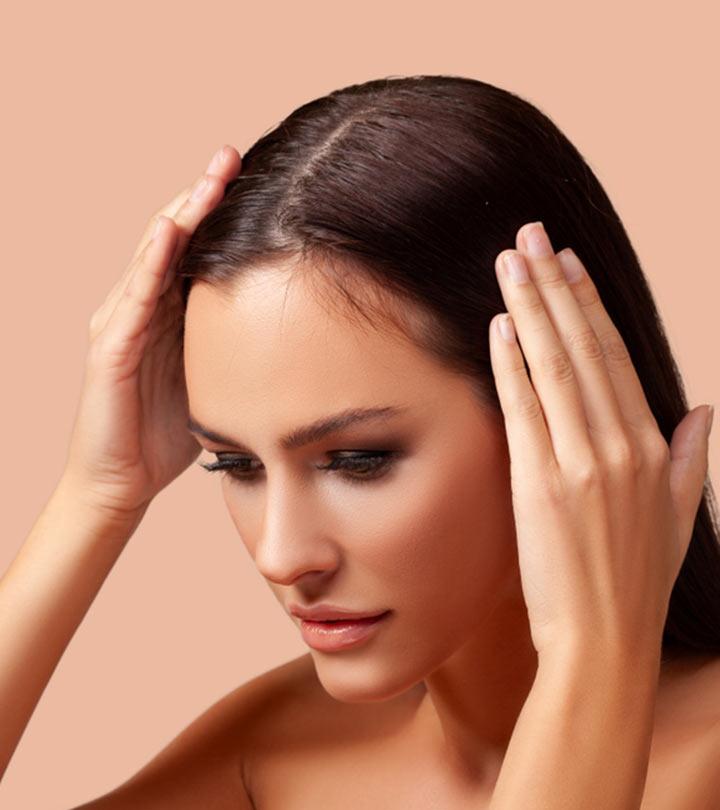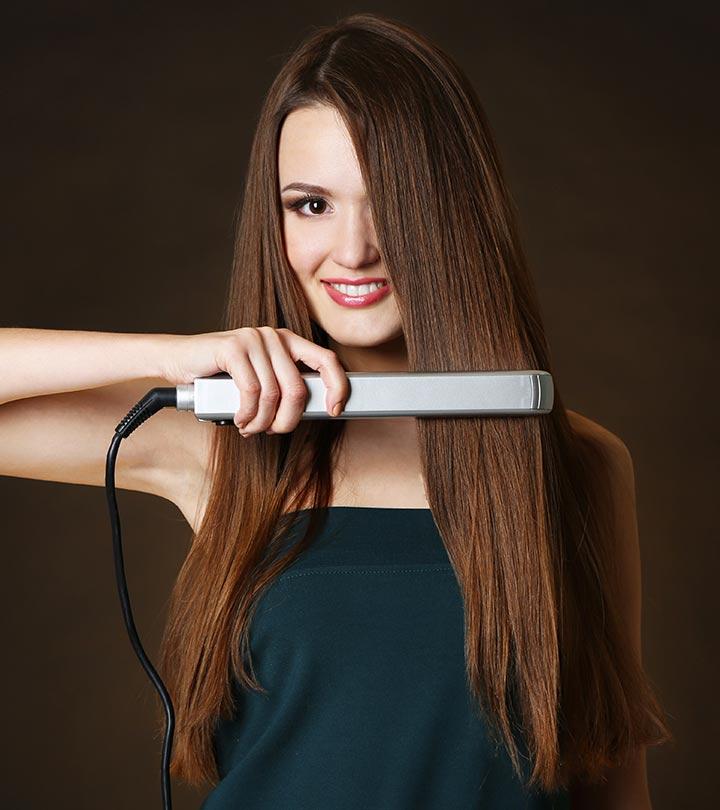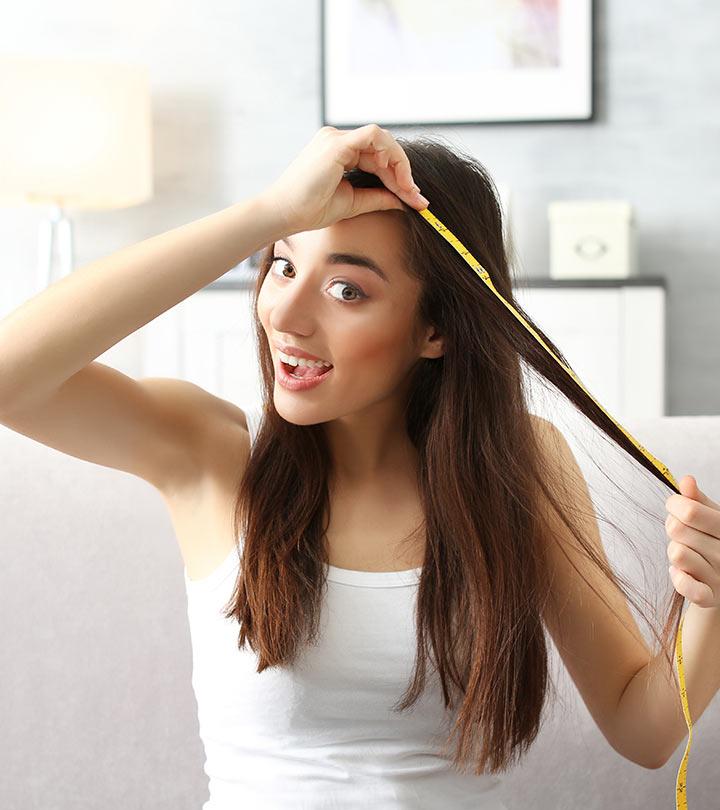How To Exfoliate Your Scalp At Home To Clear Excess Oil
Easy solutions to keep your scalp residue-free and your locks healthy and shiny.
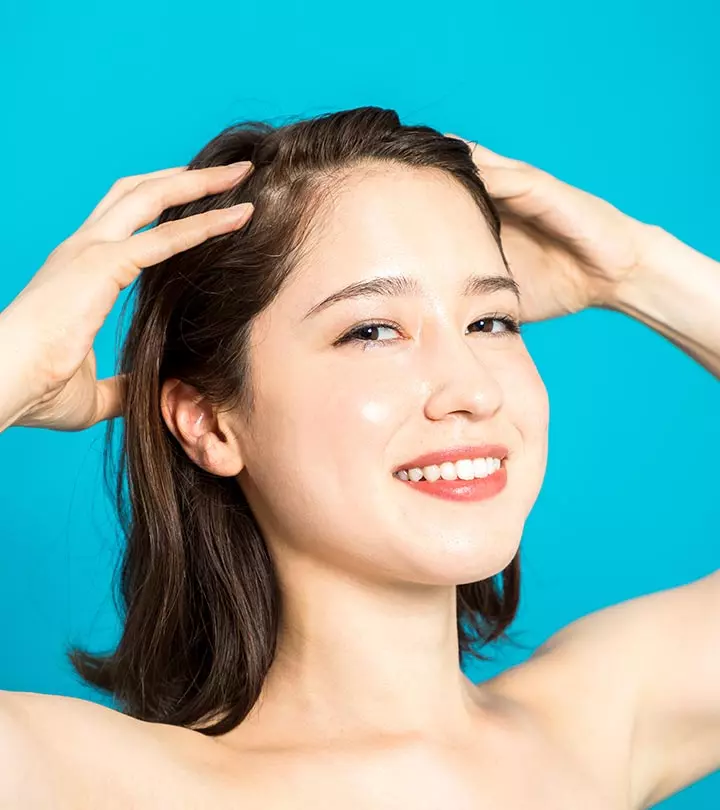
Image: Shutterstock
Exfoliating is the best way to rejuvenate your skin. Likewise, when you exfoliate your scalp, you can achieve similar results with your hair. However, if you aren’t sure about how it works for your scalp or how it benefits, then keep reading.
Scalp exfoliation has many positive effects on hair. Healthy locks begin with a healthy scalp. Your hair will grow shinier and healthier if you exfoliate your scalp regularly. Exfoliation removes excess oil, dandruff, or other impurities from your hair and helps improve scalp health. Scroll down to learn why scalp exfoliation is important for your hair care regimen and how to exfoliate your scalp, DIY scalp scrub recipes, and more. Keep reading.
In This Article
What Is Scalp Exfoliation? Why Is It Important?
Think of your scalp as a frying pan. What if you never scrubbed your frying pan clean? It is probably going to have lingering food particles and old grease stuck to its surface, may start attracting bacteria, and will possibly even impart an unpleasant taste to everything you cook in it, right?
If you ignore exfoliating your scalp, it is quite likely going to look just like this dirty frying pan! Your scalp will accumulate layers and layers of dead skin cells, dirt, impurities, and build-up from various hair care products.
 Did You Know?
Did You Know?Of course, your scalp has its own exfoliation mechanism. As new skin cells are produced, older cells are naturally shed through a process called desquamation. But this natural exfoliation process isn’t always efficient and may even slow down as you age.
So, in short, if you want to remove scalp build-up and keep your hair looking nourished and healthy, periodic exfoliation is absolutely necessary. If you are not fully convinced about the need for exfoliating your scalp, here are more of its benefits that may persuade you.
5 Ways You Can Benefit From Scalp Exfoliation
We already told you a healthy scalp equals happy hair. And this is why, when you think about protecting the health of your hair, you shouldn’t neglect your scalp. Here are five important ways in which you can benefit from including a scalp scrub in your hair care regimen:
- Removes Dead Skin Cells, Product Build-Up, And Impurities
When oil, dirt, sweat, and product debris start piling up on your scalp, it can result in unwanted consequences such as dandruff and clogged pores. Clogged pores will cause your hair to look dull and limp, and you may even start experiencing hair loss. However, exfoliation can help remove dirt and product build-up and create a healthy environment for your hair to grow.
- Improves Circulation
Another great benefit associated with the exfoliation of the scalp is that it helps to stimulate blood flow. When hair follicles are fed with a rich blood supply, it is said to reduce hair loss and release any tension and stress that is trapped in the surrounding muscles. However, there is no scientific evidence to prove the same.
- Regulates Sebum Production
Your natural sebum is what helps to keep your scalp moisturized and prevents it from drying out. Sebum production, however, decreases with age and may cause your scalp to become itchy and dry.
On the flip side, hyper-secretion of the sebaceous glandsi Small exocrine glands that open on hair follicles and release an oily or waxy substance called sebum. may cause your roots and scalp to become overly greasy. Scalp exfoliation can help to restore your scalps pH balance. Be warned, though: over-exfoliation can actually throw off the pH balance of your scalp.
- Fights Dandruff
If you are struggling with dandruff, it is another reason why you should start exfoliating your scalp. While exfoliation may not be able to address the root cause of dandruff, it will definitely help eliminate some of the flaky build-up.
- Stimulates Healthy Hair Growth
You may already be aware that product build-up on your scalp can impede hair growth. Exfoliation can cleanse and invigorate your scalp and help your hair grow thicker and shinier.
Ready to start reaping the benefits of scalp exfoliation? Here’s how you can get started.
How To Exfoliate Your Scalp The Right Way
Here are some simple steps to ensure that you are exfoliating your scalp the right way:
- Start by dividing your hair into quadrants. This will allow you to focus on one section of your scalp at a time and keep the rest of your hair out of the way.
- Using your clean fingers, gently rub in a scalp serum or scrub to the exposed scalp areas and leave it on for about 10 to 15 minutes.
- The scalp scrub or serum will loosen any unwanted product build-up, flakes, and dead skin cells.
- Using a massager or a scalp brush, start massaging your scalp lightly in order to slough off the loose flakes and debris. You should spend at least 3 to 5 minutes massaging your scalp.
- Massaging your scalp will increase blood flow and may aid hair growth (1).
- Once you have massaged your scalp well, rinse your hair out using a clarifying shampoo. Shampoos containing ingredients like aloe vera, tea tree oil, citrus extracts, rosemary leaf, and Ginkgo Biloba extract are some of the best exfoliating shampoos for cleansing the hair without stripping away its natural oils.
 Fun Fact
Fun FactScalp exfoliation is not a difficult or complicated process. Just make sure you don’t go overboard with scalp scrubbing, especially if your scalp is already flared up for some reason or you have conditions like seborrheic dermatitisi A common skin condition characterized by scaly patches, inflamed skin, and recurrence of dandruff and acne.
Now that you are ready to start exfoliating your scalp, let’s talk about how often you should be doing it.
Exfoliation For Scalp: How Often Should You Be Doing It?
The most accurate answer would be no more than once or twice a week. Frequent exfoliation can irritate your scalp and even cause hair damage. It may also result in imbalanced oil production and excessive oil build-up on the scalp.
So, you should aim to do it only once per week for the best results. If you have a sensitive scalp, thin hair, or are experiencing any kind of irritation, consider exfoliating your scalp even less frequently (only once a month or once every two weeks).
Unfortunately, many widely-used scalp exfoliating products, including scalp scrubs and serums, contain potentially harmful chemicals that could irritate and damage your scalp. If you are concerned about the chemicals lurking in scalp scrubs and looking to try out safer alternatives, here are some easy and natural scalp scrubs that you could try.
Easy Deep Cleansing DIY Scalp Scrubs
There are tons of natural scalp scrubs that you can make with ingredients easily available at home. Here are some easy recipes to make your own all-natural detoxifying scalp exfoliator:
1. Brown Sugar, Oats, And Natural Conditioner
The combination of brown sugar, oatmeal, and conditioner works as a great scalp scrub, especially if you have dry hair. It will help keep your scalp moisturized and remove any excess oils and build-up that are weighing your hair down.
You Will Need
- 2 tablespoons of any natural conditioner
- 2 tablespoons brown sugar
- 2 tablespoons finely ground oatmeal
How To Make
- Mix the natural conditioner, brown sugar, and finely ground oatmeal.
- Gently work the scrub into your scalp for a few minutes.
- Rinse it off thoroughly with a mild shampoo.
2. Coconut Oil And Sea Salt
This duo will purify and cleanse your scalp of oils, residue, and product build-up without stripping your hair and scalp of their natural oils.
You Will Need
- 1 teaspoon sea salt
- 1 teaspoon coconut oil
How To Make
- Mix the sea salt and coconut oil together.
- Dampen your hair.
- Then, gently massage the scrub into your scalp for 5-10 minutes.
- Rinse off the mixture using a clarifying shampoo.
3. Aspirin And Warm Water
Aspirin may seem like an unusual ingredient to add to a scalp scrub. However, this anti-inflammatory drug contains salicylic acid, which is claimed to be an effective ingredient for cleansing the scalp.
You Will Need
- 6 to 8 aspirin tablets
- 4 tablespoons warm water
How To Make
- Dissolve the aspirin tablets in warm water.
- Massage the mixture onto your scalp.
- Leave it on for a few minutes.
- Rinse it off with lukewarm water.
Note: Avoid this if you have a sensitive scalp.
4. Coffee And Coconut/Olive Oil
Coffee scrub for the scalp is considered one of the best-kept secrets for healthy hair growth and scalp exfoliation. Here is how you can make this homemade scalp exfoliator.
You Will Need
- 6 tablespoons finely ground coffee
- 4 tablespoons coconut or olive oil
- 2-3 drops of tea tree oil
How To Make
- Combine the fine coffee grounds with coconut or olive oil and a few drops of tea tree oil.
- Gently massage this mixture onto the scalp in circular motions.
- Leave it on for about 5 to 10 minutes.
- Rinse off the mixture with shampoo.
5. Baking Soda, Shampoo, And Tea Tree Oil
The combination of baking soda, shampoo, and tea tree oil is another DIY scalp exfoliating treatment that can cleanse your scalp of any irritating build-up. The alkaline nature of baking soda is said to relieve any itchiness, while the antifungal properties of tea tree oil prevent dandruff and moisturize and soothe the scalp.
This natural exfoliating scalp treatment is best suited for people with greasy hair and may be an effective dandruff treatment. However, if you have color-treated hair, baking soda scalp exfoliation is not recommended.
You Will Need
- 1 tablespoon baking soda
- 1 tablespoon shampoo
- 2-3 drops of tea tree oil
How To Make
- Take one heaping spoon of baking soda and combine it with shampoo and a few drops of tea tree oil.
- Massage this mixture onto your scalp for a few minutes.
- Rinse it off with lukewarm water.
Note: If you have a sensitive scalp, avoid this remedy.
6. Lemon Juice, Sea Salt, And Olive Oil
This natural scalp scrub helps to deeply cleanse the scalp and restore its natural pH level. For the scrub to be the most effective, it is recommended that you use freshly squeezed lime juice and not store-bought lime juice. Here is a step-by-step guide to making this DIY scalp exfoliator.
You Will Need
- 1 tablespoon olive oil
- 2 teaspoons freshly-squeezed lemon juice
- 1 teaspoon sea salt
How To Make
- Mix the olive oil with the lemon juice and sea salt.
- Gently rub this mixture into the scalp.
- Let it sit for 15 minutes.
- Rinse off the mixture with warm water.
7. Himalayan Salt
Himalayan salt is a natural remedy for the scalp that is believed to alleviate dandruff and promote scalp health. It is rich in minerals, and its abrasive texture may exfoliate the scalp, removing dead cells, and reduce flakiness. However, scientific research done specifically on Himalayan salt for scalp health is limited.
You Will Need
- 1 tablespoon finely ground Himalayan salt
- 2 tablespoons regular shampoo
How To Make
- Mix the Himalayan salt with the shampoo to create a scrub.
- Dampen your hair and apply the scrub directly to your scalp.
- Gently massage the mixture into your scalp for a few minutes.
- Rinse it off thoroughly and follow up with conditioner.
Tafi, a blogger, shares her experience with scalp exfoliation. She writes, “I remember as a child I used to dread having this done, even more than having my hair combed. It’s getting a comb then rubbing, actually lightly scratching the scalp, removing dandruff and flakes (i).” She continues, “I decided to consider less painful alternatives to exfoliate the scalp, probably before I co-wash my hair, so I can wash it out.” Hence, she chose to make her hair scrub with oatmeal and extra virgin olive oil.
Are you curious to know how chemical scalp exfoliation compares to physical scalp exfoliation? Let’s find out!
Chemical Vs. Physical Scalp Exfoliation: Which One Is Right For You?
Chemical scalp exfoliation involves the use of chemicals and/or enzymesi Proteins that act as biological catalysts and help speed up metabolism by accelerating chemical reactions in the body. such as an alpha hydroxy acid (AHA) called glycolic acid or a beta-hydroxy acid (BHA) such as salicylic acid. These chemicals help to dissolve any build-up and debris on the surface of the scalp.
Physical scalp exfoliation, on the other hand, involves rubbing the surface of the scalp with an abrasive substance such as sea salt, coffee, or brown sugar. Both chemical exfoliation and physical exfoliation have their benefits. But if you have a sensitive or irritated scalp, physical exfoliation might be a better pick for you.
When compared to physical exfoliators, chemical exfoliators can sometimes be quite harsh on the scalp. You could experience irritation, stinging, discomfort, or even photosensitivityi A condition characterized by the development of certain symptoms, like rashes, on skin following excess sun exposure . As such, before you pick your choice of treatment, it is important to take these facts into consideration. Avoid using any exfoliators if you experience irritation in the scalp.
That said, if you are concerned about other possible side effects associated with scalp exfoliation, here’s some information that can help.
Side Effects Associated With Scalp Exfoliation: Should You Be Concerned?
Adverse reactions can occur with scalp exfoliation. These reactions may vary from minor itching to burning, stinging, irritation, acne, or even skin damage. If you experience a side effect, it is best to stop exfoliating your scalp for a while. Consult a certified dermatologist who can get to the root of the problem and help you find an alternate treatment.
Impurities like dirt, grease, product residue, excess sebum, pollution, and other unwanted substances can settle on your scalp and clog pores. This could seriously affect your scalp and hair health. It changes your scalp pH level, which can lead to a dry scalp, fungal or bacterial infections, and skin issues. It can also cause hair loss.
But if you exfoliate your scalp on a regular basis, you remove these unwanted impurities and refresh your scalp. Choose an exfoliation treatment based on your scalp type, hair type, and hair issues. Keep in mind that while adding scalp exfoliation treatments to your hair care regimen is very beneficial, you should not over-exfoliate your scalp. Try it once every fortnight and see how your scalp reacts to the treatment.
Frequently Asked Questions
Is it safe to exfoliate your scalp?
It is completely safe and essential to exfoliate your scalp. However, remember to limit the practice to once a week. Excessive exfoliation of the scalp can either lead to loss of essential oils from the scalp or overstimulation, which increases sebum production and leaves your hair and scalp oily.
How can I exfoliate my scalp without damaging my hair?
Right after you shampoo your hair, divide your hair into sections and gently scrub your scalp with an exfoliant or use an exfoliating glove. Using gentle circular motions will also improve blood circulation in your scalp and hair follicles to boost hair growth and ensure less damage to your hair.
Does apple cider vinegar exfoliate the scalp?
Yes, apple cider vinegar can exfoliate the scalp. This vinegar has several antibacterial and antifungal properties, which are scientifically proven to be great for scalp care (2). Thus, a DIY hair scrub made of diluted apple cider vinegar and granular sugar will make for a good exfoliating remedy.
Key Takeaways
- Exfoliating your scalp has several benefits for your hair. It helps remove excess oil, dandruff, and other impurities, improves circulation, regulates sebum production, and stimulates healthy hair growth.
- Simply divide your hair into quadrants, gently put a scalp serum or scrub into the exposed scalp areas, and let it stay for 10 to 15 minutes. Lightly massage your scalp for a few minutes and rinse your hair with a clarifying shampoo.
- However, keep in mind that scalp exfoliation can have side effects. Minor itching to burning, stinging, irritation, acne, and even some skin damage are possible reactions.
Have you ever tried scalp exfoliation? Check out this video to watch experts discuss this beauty trend to help you figure out if you should add it to your hair care routine.
Personal Experience: Source
StyleCraze's articles are interwoven with authentic personal narratives that provide depth and resonance to our content. Below are the sources of the personal accounts referenced in this article.
i. Exfoliating the scalp…. Just thinking…..https://tafistresses.wordpress.com/2013/04/24/exfoliating-the-scalp-just-thinking/
References
Articles on StyleCraze are backed by verified information from peer-reviewed and academic research papers, reputed organizations, research institutions, and medical associations to ensure accuracy and relevance. Read our editorial policy to learn more.
- Standardized Scalp Massage Results in Increased Hair Thickness by Inducing Stretching Forces to Dermal Papilla Cells in the Subcutaneous Tissue
https://www.ncbi.nlm.nih.gov/pmc/articles/PMC4740347/
Read full bio of Dr. Madhuri Agarwal
Read full bio of Ramona Sinha
Read full bio of Medha Deb






